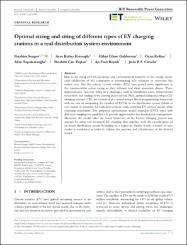Optimal sizing and siting of different types of EV charging stations in a real distribution system environment

Göster/
Tarih
2022Yazar
Şengor, İbrahimErenoğlu, Ayşe Kübra
Güldorum, Hilmi Cihan
Erdinç, Ozan
Taşcıkaraoğlu, Akın
Taştan, İbrahim Can
Üst veri
Tüm öğe kaydını gösterKünye
Sengor, I., Erenoglu, A.K., Guldorum, H.C., Erdinc, O., Taşcıkaraoğlu, A., Taştan, İ.C., Büyük, A.F., Catalão, J.P.S.: Optimal sizing and siting of different types of EV charging stations in a real distribution system environment. IET Renew. Power Gener. 00, 1– 13 (2022). https://doi.org/10.1049/rpg2.12566Özet
Due to the rising of both economic and environmental concerns in the energy sector, each subdivision of the community is investigating new solutions to overcome this critical issue. For this reason, electric vehicles (EVs) have gained more significance in the transportation sector owing to their efficient and clean operation chance. These improvements, however, bring new challenges such as installation costs, infrastructure renovation, and loading of the existing power system. Here, optimal sizing and siting of EV charging stations (CSs) are examined in a mixed-integer linear programming framework with the aim of minimizing the number of EVCSs in the distribution system (which in turn means to minimize CS-related investment while satisfying EV owners' needs) while satisfying constraints. The proposed optimization model considers EVCS types with different charging rate capabilities to provide opportunities for demand-side management. Moreover, the model takes the actual behaviour of the battery charging pattern into account by using real measured EV charging data together with the consideration of an actual distribution system belonging to a region in Turkey. Lastly, a bunch of case studies is conducted in order to validate the accuracy and effectiveness of the devised model.

















